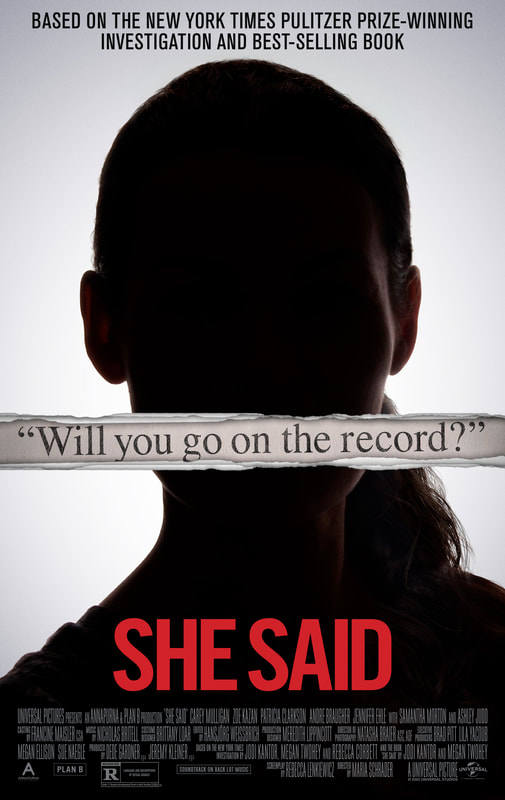“She Said” Forgoes Explicit Trauma and Emotional Manipulation in Order to Respect Survivors of Abuse11/17/2022 When a story about a crime or scandal breaks, you can bet that there’s a movie producer somewhere who’s already in negotiations over the rights to that story — and I can’t blame them. Humans are naturally curious, and there’s something inherently intriguing about the psychology of serial killers and the complex webs of events behind white-collar crimes. In October of 2017, when journalists Jodi Kantor and Megan Twohey published a story that exposed the crimes of Harvey Weinstein, producers Dede Gardner and Jeremy Kleiner had acquired rights to a movie version of the story within a few months. The hasty move seems, at first glance, exploitative and unethical. Why would anyone be in such a rush to make a movie about such a personal and traumatic topic? Can you make such a movie that doesn’t exploit the painful memories of the survivors? But after watching She Said, it’s clear that Gardner and Kleiner, along with director Maria Schrader and writer Rebecca Lenkiewicz, had one goal in mind: to give voice to the survivors in a truthful and respectful way. Weinstein, who is now behind bars, received more than enough attention both before and after the allegations broke. She Said works to shift the conversation about sexual abuse in Hollywood from the perpetrators to the survivors. Before getting into the details of the movie itself, it should be noted that Brad Pitt, one of the movie’s producers, has been accused of abuse by ex-wife Angelina Jolie. It has also been reported that Pitt knew about Weinstein’s abuse and harassment and continued working with him anyway. It’s all too easy to separate facts about a movie’s production from the movie itself, especially if it’s a movie you want to like. While the knowledge of Pitt’s involvement did not affect my experience watching She Said, it is my opinion that he should have never been allowed to come on board the project. I hope that, at the very least, the production team and Pitt himself will address the issue publicly. She Said is a fictionalized (though based in fact) account of Kantor and Twohey’s investigative efforts to expose Weinstein and shed light on systemic abuse in Hollywood. As a film about investigative journalism, She Said is in danger of glamorizing the lives of the two journalists and exploiting the women whom they interview. Thankfully, however, She Said is respectful of the real-life people who inspired the story, and it portrays Kantor and Twohey gracefully without idolizing them. Granted, it’s hard to not see the two driven and passionate career women as the epitome of success. As the confident and experienced Megan Twohey, Carey Mulligan trades in the bright lipsticks and colorful wigs of Promising Young Woman (2020) for the neutral outfits and minimalist makeup of an NYC career gal, complete with a cup of coffee that never seems to leave her hand. Mulligan takes on the role with controlled confidence, losing her cool only when necessary. Zoe Kazan also transforms into a working supermom who makes her job look easy, and her energy and optimism contrast nicely with Mulligan’s cautiousness. Yet, both characters are slightly underdeveloped. Kazan’s version of Jodi Kantor is, at times, one-dimensional. When Kantor slips up and accidentally gives too much information to the husband of a potential source, you can’t even tell that it’s supposed to be a nervous slip-up until later, when Kantor explains her mistake to Twohey. The exchange just comes across as badly written dialogue delivered by an actress who isn’t quite sure what her characters is supposed to be feeling. The real issue with the two lead characters, however, is that the script can’t decide how much of their personal lives it wants to show. The beginning of the film briefly explores Twohey’s battle with postpartum depression, and both women are shown with their children and husbands throughout the film. However, their roles as mothers become a narrative decoration that adds easy emotion to key scenes. She Said only reminds us that the two main characters are mothers when it’s convenient for the story (or when the slow pacing needs to be broken up by shots of Twohey admiring her newborn). Compared to other based-on-a-true story films, She Said is much more subtle and subdued. Although there are a few tense moments, it’s certainly not a thriller. Given the subject matter, this is probably a good thing. The movie is neither exploitative nor emotionally manipulative, and it keeps all the traumatic events off screen. So, without the usual thrills and theatrical performances of based-on-a-true-story movies, what drives the plot of She Said? Much like the real process of investigative journalism, the movie trudges forward at a snail’s pace. Just when you think that Twohey and Kantor have uncovered something big, they encounter yet another roadblock. The main thing standing in their way is that no woman they contact wants to go on the record. The plot, then, is driven by the reporters’ determination to find just one survivor who will share her story publicly. When Twohey and Kantor present their initial findings to their editors, they’re told that without a source who’s willing to go on the record, they have no story. When Twohey tracks down a former Miramax employee who’s been waiting years to tell her story, she cannot tell it for fear of being sued. As the reporters discover more and more shocking evidence against Weinstein, it all comes down to whether or not someone will be willing to share their story and make their accusations public. It’s no accident or coincidence that Lenkiewicz made this the driving issue of the script. One of the first things that women are asked when they make accusations of assault or harassment is why they didn’t come forward sooner — and She Said blows that manipulative and ignorant question out of the water. Of course, Kantor and Twohey’s ultimate goal isn’t just to get survivors to share their stories. They also want to expose Weinstein and prevent him (and others) from continuing the cycle of abuse. And yet, She Said isn’t as focused on Weinstein himself as it is on the survivors. In fact, the actor portraying Weinstein is only ever shown from behind. Unlike reenacted true crime dramas like Dahmer (2022), which gives much more attention to the perpetrator than he deserves, She Said shows respect to the survivors. Rather than showing harassment or assault on screen, the movie only includes verbal descriptions of assault — and it often uses the survivors’ own words. These are not emotionally manipulative or tear-jerking speeches meant to produce a cathartic effect. Instead, the survivors’ words are uncomfortable, unsettling and undeniably honest. When Laura Madden (Jennifer Ehle) shares her experience as a former Miramax employee, she struggles to say certain explicit words and only manages to get them out in a whisper. Her voice fades in and out as she fights against palpable trauma and embarrassment. Rather than focusing on the perpetrators of abuse, She Said gives voice to the survivors and sheds light on the shame and fear that they feel. Still, She Said is undeniably empowering. As the words of Laura Madden and others fill the theater, they seem to come from some place beyond the screen. She Said puts these testimonies plainly before the world, with minimal dramatic enhancements, and lets the words speak for themselves. The experience of watching the movie is sobering and humbling. Although the pace is slow, you can feel that the thing weighing it down is the exceedingly frustrating system that silences victims of abuse and keeps abusers in power. She Said isn’t the most entertaining or cinematic movie you’ll see this year, but it is one of the most honest.
0 Comments
Leave a Reply. |
"Our embodied spectator, possibly perverse in her fantasies and diverse in her experience, possesses agency...finally, she must now be held accountable for it." Categories
All
|







